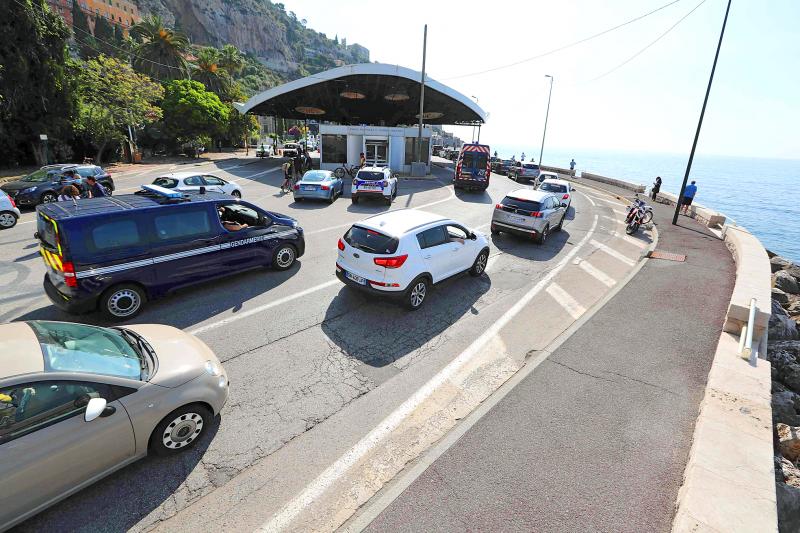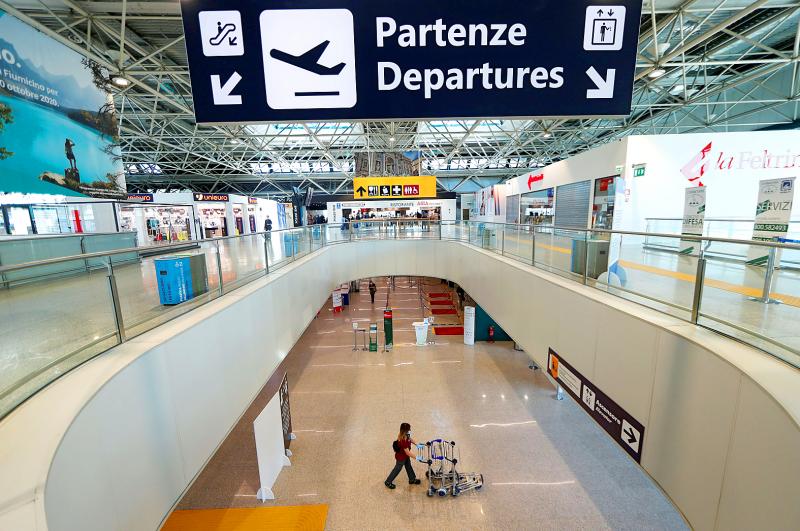Italy reopened to travelers from Europe yesterday, three months after the country went into coronavirus lockdown, with all hopes pinned on reviving the key tourism industry as the summer season begins.
Gondolas were ready to punt along Venice’s canals, lovers will be able to act out Romeo and Juliet on Verona’s famed balcony, and gladiator fans can pose for selfies at Rome’s Colosseum.
However, there were fears many foreign tourists would be put off traveling to a country still shaking off a vicious pandemic.

Photo: AFP
“Come to Calabria. There’s only one risk: that you’ll get fat,” Calabria Governor Jole Santelli said on Sunday as the race began to lure big spenders — or any spenders — back to Italy’s sandy shores.
Italy was the first European country to be hit hard by the novel coronavirus and has officially reported more than 33,500 deaths. It imposed an economically crippling lockdown in early March and has since seen its contagion numbers drop off dramatically.
It is still reporting hundreds of new COVID-19 cases a day, particularly in the northern Lombardy region, and experts warn the government might be being hasty in permitting travel between regions and abroad.

Photo: Reuters
“We hoped to see some movement from today, but have no foreign tourists booked in for this week or next,” said Alessandra Conti, receptionist at the Albergo del Senato hotel, which overlooks the Pantheon in Rome.
“We’ve got a few reservations from mid-June ... [but] are still getting lots of cancelations for this summer,” she said.
International flights were only expected to resume in three main cities: Milan, Rome and Naples, and there were concerns that those who usually come in by road, train or ferry from neighboring countries would go elsewhere on their holidays.
Switzerland has warned its citizens that if they go to Italy they would be subject to “health measures” on their return. The country is to open its borders with Germany, France and Austria on June 15, but not with Italy.
Austrian Minister of Foreign Affairs Alexander Schallenberg yesterday told a news conference in Vienna that entry checks at Austria’s land borders would all be scrapped as of today, except those at the frontier with Italy.
Other countries, such as Belgium and Britain, are still advising against, or forbidding, all nonessential travel abroad.
In response to perceived anti-Italian sentiment, Italian Minister of Foreign Affairs Luigi di Maio has said countries should not to treat Italy “like a leper.”
Arrivals from Europe would not be required to self-isolate unless they have recently traveled from another continent.
At the border between the town of Ventimiglia in Italy and Menton in France, more people were trying to enter France from Italy than the other way round early yesterday, but controls on the French side were very strict.
“The situation is a bit complex. There is a total reopening of the Italian borders, but the situation is not the same on the French side,” a police source said, as drivers stuck in long lines sounded their horns.
Italy’s lockdown has had a particularly devastating effect on the tourism sector, which amounts to about 13 percent of GDP. Historic sites were shut, restaurants closed and hotels were used to care for COVID-19 patients.
Restaurants, cafes and beach establishments have slowly reopened over the past two weeks, but the government has said it reserves the right to impose localized lockdowns if it sees contagion numbers rise.
Only 40 of Rome’s 1,200 hotels have reopened, the Corriere della Sera newspaper said on Monday, and just a dozen in Milan. It costs too much to open them if they will just stand empty.
“My hoteliers all want to reopen, but as long as the borders remain closed, it’s not possible,” Marco Michielli, deputy head of the hoteliers’ association Federalberghi, said on Saturday.
Italy’s national tourism agency said about 40 percent of Italians traditionally travel abroad for their holidays, but could be forced this year to vacation at home, helping local businesses.
That might be little comfort to those running costly historic sites, because most of the tens of thousands of visitors that usually flock daily to the Tower of Pisa, Pantheon or Pompeii come from abroad.

POLITICAL PRISONERS VS DEPORTEES: Venezuela’s prosecutor’s office slammed the call by El Salvador’s leader, accusing him of crimes against humanity Salvadoran President Nayib Bukele on Sunday proposed carrying out a prisoner swap with Venezuela, suggesting he would exchange Venezuelan deportees from the US his government has kept imprisoned for what he called “political prisoners” in Venezuela. In a post on X, directed at Venezuelan President Nicolas Maduro, Bukele listed off a number of family members of high-level opposition figures in Venezuela, journalists and activists detained during the South American government’s electoral crackdown last year. “The only reason they are imprisoned is for having opposed you and your electoral fraud,” he wrote to Maduro. “However, I want to propose a humanitarian agreement that

ECONOMIC WORRIES: The ruling PAP faces voters amid concerns that the city-state faces the possibility of a recession and job losses amid Washington’s tariffs Singapore yesterday finalized contestants for its general election on Saturday next week, with the ruling People’s Action Party (PAP) fielding 32 new candidates in the biggest refresh of the party that has ruled the city-state since independence in 1965. The move follows a pledge by Singaporean Prime Minister Lawrence Wong (黃循財), who took office last year and assumed the PAP leadership, to “bring in new blood, new ideas and new energy” to steer the country of 6 million people. His latest shake-up beats that of predecessors Lee Hsien Loong (李顯龍) and Goh Chok Tong (吳作棟), who replaced 24 and 11 politicians respectively

Young women standing idly around a park in Tokyo’s west suggest that a giant statue of Godzilla is not the only attraction for a record number of foreign tourists. Their faces lit by the cold glow of their phones, the women lining Okubo Park are evidence that sex tourism has developed as a dark flipside to the bustling Kabukicho nightlife district. Increasing numbers of foreign men are flocking to the area after seeing videos on social media. One of the women said that the area near Kabukicho, where Godzilla rumbles and belches smoke atop a cinema, has become a “real

‘POINT OF NO RETURN’: The Caribbean nation needs increased international funding and support for a multinational force to help police tackle expanding gang violence The top UN official in Haiti on Monday sounded an alarm to the UN Security Council that escalating gang violence is liable to lead the Caribbean nation to “a point of no return.” Special Representative of the UN Secretary-General for Haiti Maria Isabel Salvador said that “Haiti could face total chaos” without increased funding and support for the operation of the Kenya-led multinational force helping Haiti’s police to tackle the gangs’ expanding violence into areas beyond the capital, Port-Au-Prince. Most recently, gangs seized the city of Mirebalais in central Haiti, and during the attack more than 500 prisoners were freed, she said.